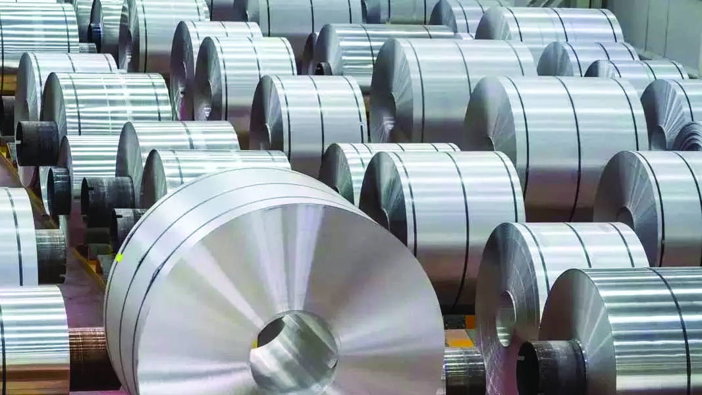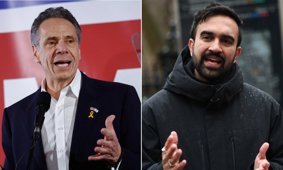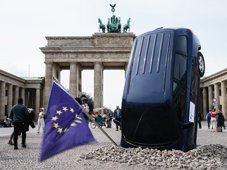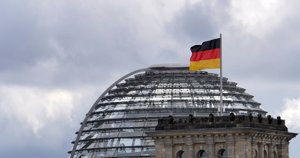
Germany Considers Tariffs to Shield Steel Industry
German leaders propose tariffs to support local steel production and push for a government-backed green transformation.
Germany’s debate over the future of its steel industry intensified this week as political leaders and industry representatives gathered for a high-level “steel summit” at the Chancellery in Berlin. The meeting, scheduled for Thursday, comes amid growing calls within the government and the European Union for import tariffs to shield domestic producers from low-priced competition, particularly from China.
The discussion reflects mounting pressure on policymakers to balance industrial transformation toward climate-neutral production with the urgent need to preserve competitiveness in one of Europe’s most strategic manufacturing sectors.
Growing Momentum for Protective Tariffs
Amid mounting economic strain in Europe’s steel industry, several EU lawmakers have begun openly discussing punitive tariffs on steel imports from China. Support for such measures has also emerged from Germany’s Saarland state premier, Anke Rehlinger of the Social Democratic Party (SPD), who argued that domestically produced steel “must have a fair chance” in the market. Speaking on Bericht aus Berlin, she emphasized that German producers should not be forced to compete against artificially low “dumping prices.”
“If our industry must battle against unfairly priced imports, that is not fair competition,” Rehlinger said. “We must, if necessary, rely on tariffs. It would be wrong to destroy what can never be rebuilt afterward.”
Her remarks came days before the federal government convened the much-anticipated steel summit, intended to map out a sustainable path for an industry facing high energy costs, global overcapacity, and a slow transition to green production methods.
Sharp Criticism of China’s Trade Practices
Echoing Rehlinger’s concerns, CDU Secretary General Carsten Linnemann delivered unusually strong criticism of Chinese trade policies, warning that Chinese companies—backed by state subsidies—are deliberately selling steel below market price to push European competitors out of business. “These practices have nothing to do with a social market economy,” Linnemann said, calling on the European Union to respond swiftly by imposing anti-dumping duties.
According to Linnemann, Beijing’s strategy is to flood the market with cheap steel, force European producers to scale back, and then raise prices once competitors are weakened. “This is unfair and dangerous,” he said, adding that the EU must show resolve and protect its industries before permanent damage is done.
A Summit Aimed at Transformation
Rehlinger outlined clear expectations for the Chancellery meeting, insisting that the government make a firm commitment to the ongoing transformation toward environmentally sustainable steelmaking. “The companies have already made significant advance investments,” she noted. “But the workforces also need to know that they can rely on the federal government.” She pointed to provisions in the coalition agreement that already include “sensible, correct, and necessary” measures to support this process.
The transformation of Germany’s steel sector—long a backbone of its industrial strength—into a carbon-neutral model is central to the country’s broader climate strategy. However, rising energy prices, regulatory uncertainty, and foreign competition have left many producers struggling. The summit was expected to address both the structural transition to green hydrogen-based production and the immediate need for fair market conditions.
Reform Calls Beyond Steel
In addition to trade policy, Linnemann used his appearance on Bericht aus Berlin to urge the government to show greater courage in pursuing structural reforms. He cited measures such as electricity tax reductions, lower network fees, and corporate tax relief as positive first steps, but said more needed to be done to revive growth.
The CDU leader identified pending debates around Germany’s citizen benefit (Bürgergeld) and a proposed “active pension” model as areas requiring bold decisions. “More than half of Germans say change is needed,” Linnemann noted, pointing out that meaningful reforms have not been implemented in two decades. However, he declined to discuss individual tax or contribution measures, emphasizing that “everything must be negotiated as part of a comprehensive package.”
His remarks signal growing impatience within conservative ranks over what they see as sluggish economic reform under Chancellor Olaf Scholz’s coalition.
SPD Rejects Claims of Reform Resistance
Rehlinger, speaking earlier in the week, also called for greater reform momentum but rejected criticism that the SPD was blocking change. “Reforms are necessary to repair infrastructure, make social security systems more effective, and modernize administration,” she said. At the same time, she stressed that reform proposals must be evaluated carefully to ensure fairness. “It’s also about examining who will bear the burden,” she added.
Rehlinger said that any strategy to limit social insurance contributions must be comprehensive rather than focused solely on cutting benefits. “It cannot be that only benefits are reduced,” she warned, calling instead for a balanced approach that preserves both fiscal stability and social cohesion.
A Sector Under Strain
Germany’s steel industry, once a global powerhouse, now faces unprecedented challenges. Demand has stagnated amid weakening construction and manufacturing activity, while the cost of decarbonization continues to rise. The European Steel Association (EUROFER) has repeatedly warned that without stronger trade defenses and support for green technologies, European producers could lose significant market share to subsidized competitors.
At the same time, the EU’s Carbon Border Adjustment Mechanism (CBAM)—which will impose carbon costs on imported steel—remains in a transitional phase. Until it fully takes effect, European producers continue to face an uneven playing field.
Analysts note that the combination of high energy taxes, rising environmental costs, and subsidized imports has left many plants operating at the edge of profitability. In Germany, approximately 40,000 direct jobs and several hundred thousand indirect ones depend on the steel supply chain, particularly in regions such as North Rhine-Westphalia and Saarland.
| Indicator | Approximate Value (2024) | Context |
|---|---|---|
| Annual production | ~35 million tons | 6th largest producer globally |
| Employment | ~40,000 direct jobs | Concentrated in NRW & Saarland |
| Export share | 60% | EU & global markets |
| Share of EU output | 25% | Leading EU producer |
| Energy share of costs | ~30% | Major factor in competitivenesssw |
Figures derived from public EU and industry statistics referenced in parliamentary discussions.
These figures underline the sector’s strategic relevance—not only economically but also socially. The closure or downsizing of key plants could have ripple effects throughout Germany’s industrial base.
Risks and Scenarios
The debate surrounding tariffs and transformation policies presents multiple risk pathways for policymakers and industry stakeholders:
- Trade Retaliation: If the EU imposes tariffs on Chinese steel, Beijing could respond with counter-measures affecting European exports in other sectors, such as automotive or machinery.
- Cost of Green Transition: The high capital expenditure required to switch to hydrogen-based production could erode competitiveness if public subsidies are insufficient or delayed.
- Energy Price Volatility: Persistent high electricity prices may deter investment in modernization projects, undermining the shift toward green steel.
- Political Friction within the EU: Diverging national interests—particularly between heavily industrialized member states and those emphasizing fiscal restraint—could delay coordinated action on tariffs or subsidies.
Despite these risks, proponents argue that decisive intervention is vital to prevent irreversible industrial decline.
The Broader Economic Context
The tariff debate comes as Europe grapples with sluggish growth and high inflation. For Germany, the continent’s largest economy, the manufacturing sector remains under pressure from weak global demand, geopolitical uncertainty, and domestic regulatory burdens. Many observers view the steel summit as a test of whether Berlin can align climate goals with industrial competitiveness.
For the Scholz government, success will depend on reconciling differing priorities among coalition partners: the SPD’s focus on social fairness, the Greens’ emphasis on sustainability, and the FDP’s insistence on fiscal discipline. Rehlinger’s call for a clear government commitment to transformation underscores the growing impatience among regional leaders who fear job losses if Berlin fails to act decisively.
Expert and Political Reactions
Industry groups have broadly welcomed the idea of a unified national strategy. However, they warn that rhetoric must translate into concrete policy. “Without clarity on energy costs and carbon compensation, companies cannot plan their investments,” one trade association representative told Tagesschau.
Economists note that the EU’s existing trade-defense instruments are often too slow to respond to fast-moving market distortions. They argue that a proactive stance on anti-dumping tariffs could protect critical value chains while maintaining compliance with World Trade Organization rules.
Meanwhile, environmental organizations continue to press for conditions ensuring that public subsidies are tied to measurable decarbonization goals, not simply industrial protectionism. This reflects a broader European debate over how to balance short-term competitiveness with long-term climate commitments.
What Happens Next?
The steel summit is expected to produce a joint declaration outlining key policy principles rather than binding commitments. Discussions are likely to center on three main pillars:
- Trade Defense: Coordinated EU action to deter dumping and protect domestic capacity.
- Green Transformation Support: Expansion of hydrogen and carbon-capture incentives.
- Energy Cost Relief: Measures to reduce industrial electricity taxes and stabilize network fees.
Observers expect follow-up meetings involving EU trade authorities and national ministries in early 2026, where detailed tariff and subsidy proposals will be finalized.
As both Rehlinger and Linnemann stressed, the decisions made in the coming months could determine whether Germany remains a leading steel nation or cedes ground to subsidized global competitors. “It would be wrong,” Rehlinger said, “to break what we may never rebuild.”
Source: tagesschau.de






